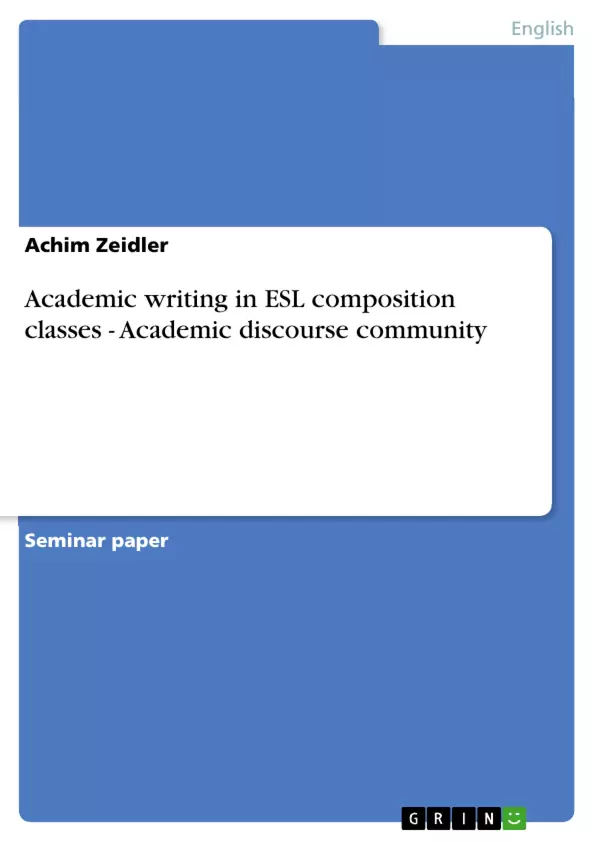This paper discusses the concept of Academic Writing and the role of the importance in the ESL classroom. The different perspectives that have to be considered while teaching writing for an Academic purpose and some teaching approaches will be mentioned and evaluated. Thereby the focus will be on the different opinions and methods, as well as constraints and problems that scholars investigated about the notion of Academic Writing. There are a lot of discussions and some research has recently tried to define how the particluar and varied academic discourse communities have to be considered in the curriculum of ESL learners, but still there is a lot of uncertainty of how effective classroom teaching in composition or content classes lead to a the demanded knowledge transformation that the ESL students need in order to fit successfully into a special academic field and write with respect to the expectations of that special audience. This paper tries to mention the most important articles and findings in order to understand the notion of Academic writing and examines some of the constraints students as well as teachers have to deal with and summarizes also some opportunities of making students aware of specific styles, formats, and conventions that are needed in their particular discourse communities and that can and should be involved in ESL composition and content classes with English for an academic purpose to achieve a desired participation in the higher-educational level through fullfilment of the writing standards of educational and academical conventions and values of a particular discourse community.
A working definition of Godev explains the notion of Academic writing: „The term ´academic writing´ seems to escape any definition that may try to encompass every writing task likely to be encountered in any of the academic disciplines.” (Godev 2000, 636). The reason for this is that the style of a given academic product is defined by conventions that are ultimately dicipline specific as Spack pointed out. (Spack 1988, 32). Nevertheless there are four different perspectives that have to be considered to get a wider understanding of the term academic writing.
The notions of a) audience, b) task, c) communicative functions, and d) style are very crucial in order to conceive a working definition of academic writing.
The four different perspectives have different views of and about academic writing. Gajdusek & van Dommelen 1993, 202) as well as Silva (1991) stated that from the perspective of the audience, academic writing is a kind of writing accepted by the faculty of a particular discourse community when discussing a topic in a published material or when the members of the special discourse community adress themselves to others of the same one orally. Silva explained the notion of audience a little bit more explicit. His definition of audience says that “academic writing is prose that will be acceptable at an American academic institution.” ..
Inhaltsverzeichnis (Table of Contents)
- Academic Writing in ESL Composition Classes
- A Working Definition of Academic Writing
- Audience Perspective
- Task Perspective
- Communicative Functions Perspective
- Style Perspective
- Problems in ESL Composition Classes
- Types of Writing in EAP Composition Classes and Academic Content Courses
- Preparing Students for Academic Content Classes
- Classroom-Based Teaching
- Department-Specific Work
Zielsetzung und Themenschwerpunkte (Objectives and Key Themes)
This paper aims to explore the concept of academic writing within ESL composition classes, considering various perspectives and teaching approaches. It examines the challenges and opportunities involved in preparing ESL students for the specific demands of different academic discourse communities.
- Defining Academic Writing: Exploring the multifaceted nature of academic writing, considering audience, task, communicative functions, and style.
- Challenges Faced by ESL Students: Identifying the difficulties ESL students encounter in transitioning from personal writing to academic writing.
- Limitations of Traditional ESL Composition: Analyzing the shortcomings of focusing primarily on personal writing in ESL composition classes.
- Effective Teaching Approaches: Investigating effective teaching strategies to bridge the gap between ESL composition and academic writing demands.
- Adapting to Discourse Communities: Emphasizing the importance of adapting writing styles and conventions to specific academic disciplines.
Zusammenfassung der Kapitel (Chapter Summaries)
The paper begins by introducing the concept of academic writing and its importance in ESL contexts. It then delves into a working definition of academic writing, examining four key perspectives: audience, task, communicative functions, and style. Each perspective offers a unique insight into the complexities of academic writing. Subsequent sections discuss the problems encountered by ESL students transitioning to academic writing, focusing on the limitations of personal writing and the need for more exposure to different writing genres. The paper concludes by exploring teaching approaches that can effectively prepare ESL students for the demands of upper-level academic courses, including classroom-based instruction and department-specific work.
Schlüsselwörter (Keywords)
Academic writing, ESL, EFL, composition, discourse communities, teaching approaches, genre conventions, rhetorical awareness, personal writing, academic content courses, upper-level courses.
Frequently Asked Questions
What is "Academic Writing" in an ESL context?
Academic writing refers to the specific styles, formats, and conventions required in higher education, which ESL students must master to succeed in their disciplines.
Why do ESL students struggle with academic discourse?
Many students are used to personal writing and find it difficult to transition to the discipline-specific conventions and objective tone required in academic fields.
What are the four perspectives of academic writing?
The four perspectives are audience (expectations of faculty), task (specific assignments), communicative functions (purpose), and style (language conventions).
How can teachers prepare students for content classes?
Effective strategies include classroom-based teaching focused on genre awareness and department-specific work that mirrors real academic tasks.
What is "English for Academic Purposes" (EAP)?
EAP is a teaching approach that focuses on the specific language skills and academic standards needed for participation in university-level education.
- Quote paper
- Achim Zeidler (Author), 2005, Academic writing in ESL composition classes - Academic discourse community, Munich, GRIN Verlag, https://www.grin.com/document/124092



